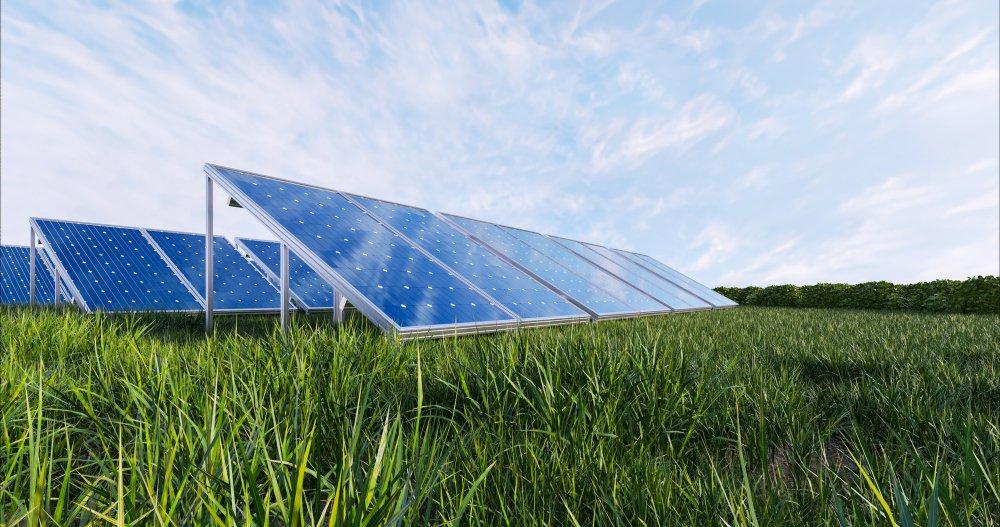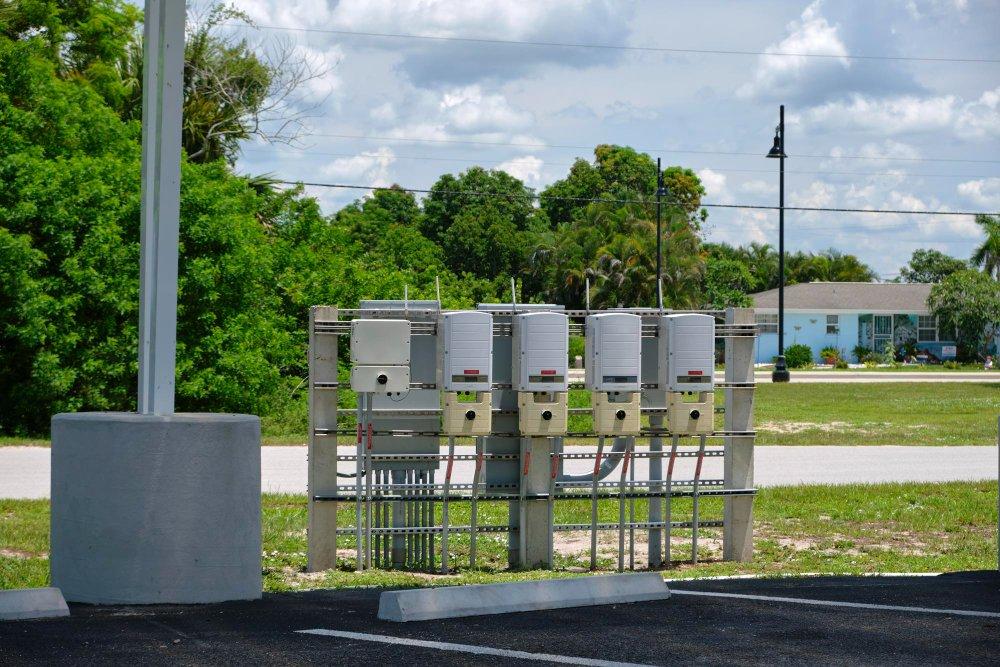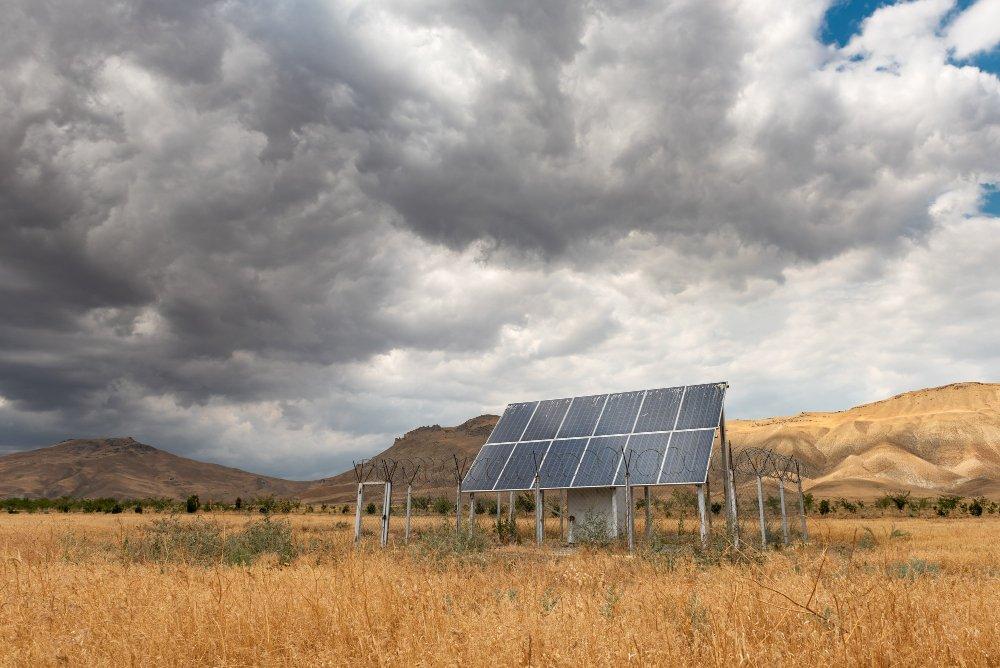Over the years, solar panels have become popular among regular users and people who want to save on energy bills. The government offers various incentives and rebates in some places so that people can invest in solar power panels. A 100-watt solar panel for RV is ideal for anyone looking for a convenient size and portable option for RVing.
Although a 100-watt solar panel can effectively produce sufficient energy, it is smaller than the typical solar panel. Therefore, you might only power smaller devices with it.
Terminology for Solar Power System
#1 Batteries

For RVs, lead-acid batteries are the most commonly used ones. You can check how much the batteries are charged by looking somewhere in your rig. Although it doesn’t give the exact date, it gives a reasonable idea.
Draining the lead-acid battery entirely is not harmful, but if you want it to last longer, don’t let it go below 50%. New lithium-ion batteries are not popular in RVs due to their high cost.
#2 Types of Solar Panels

Commonly, two types of solar power panels are available in the market, i.e., monocrystalline and polycrystalline. The monocrystalline solar system panels are known to be much more efficient, but they are on the expensive side.
The solar energy system can be minor for a small RV with little roof space. So, it’s better to choose monocrystalline panels because these are more efficient and, for a little extra cost, probably a couple of hundred dollars, it wouldn’t break the bank. And it will save you more money in the long run; after all, these panels last for 25 years
#3 Flexible Vs. Flat Solar Panels
Next on the list is the flexible and flat solar power panels. The flat panels are more flexible and durable. Plus, these are less expensive and come with a better warranty. On the flip side, flexible panels are lighter, more aerodynamic, and can be easily mounted.
#4 Solar Charge Controller

Solar power panels offer 16 to 20 volts of electrical potential. But the RV battery can only handle 12 volts.
A standard solar charge controller is great if you don’t use an RV in icy conditions[1] or have an unusual setup.
How Big is a 100-Watt Solar Panel?
Depending on the efficiency of the 100-watt solar power panels, they vary in size. But a typical one is designed with 47 x 21.3 x 1.4 inches. If you purchase a 100-watt solar panel, you can get a 100-watt solar panel kit that includes a module, cables, brackets, solar charge controller, mounting hardware, and charger.
Or a 100-watt solar module. Many factors influence the effectiveness of this solar panel, including materials, quality, and manufacturer.
The price, efficiency, and included equipment vary depending on the brand. Usually, this kind of solar panel costs around $100 or less. But if you want a complete Solar Starter kit with mounting hardware, look to pay roughly around $150.
Factors Influencing Whether 100-Watt Solar Panel for RV is Enough or NOT?
Whether a 100-watt solar panel will offer enough power for an RV is hard to tell. Certain factors can have a more significant impact on the amount of electricity required. It can also determine whether or not you must use a 100-watt solar panel.
Here’s what determines the amount of required solar energy for an RV. Scroll down to have a look.
#1 The Length of Your Trip
The length of your trip dramatically influences the energy you need for an RV. A 100-watt solar panel seems excellent for a weekend trip.
But you might need more energy for a more extended trip. That’s because a 100-watt solar panel might not offer sufficient energy to keep up all the electrical appliances.
#2 Number of People Living in RV
If more people live in the RV, you will need more electricity. A 100-watt solar panel can offer sufficient energy for a single person or two. But this solar panel will not be a great option to cater to the needs of a family.
#3 Type of Appliances You Want to Run
The appliance you want to run in your RV can significantly impact the electricity requirement. Using a 100-watt solar panel, you can generate sufficient energy for cell phones, laptops, lamps, WiFi routers, and similar small devices.
But a 100-watt solar panel might not be sufficient if you wish to power bigger appliances.
#4 Number of Solar Panels You Have
Supplying enough electricity for an RV using a 100-watt solar panel can be difficult. Thus, it would help if you used more panels to support the RV.
#5 Other Sources of Energy
Besides panels, you can use many other sources to provide sufficient energy to the RV. Some familiar sources include energy the engine creates while driving, wind power, or a generator. You can also use a power outlet on a camping ground to charge batteries.
A single 100-watt solar panel for an RV will be sufficient if you combine the energy created by other sources. But a single panel might not be sufficient if you solely rely on a 100-watt solar panel.
#6 Batteries
One thing that strongly influences the number of appliances you can run is the batteries. You can store the extra energy by combining batteries with a 100-watt solar system.
Remember that the size and the number of batteries you use play a significant role in deciding how much power you can store. You can read more about what size of the solar panel is needed to charge a 12 Volt Battery.
Using combined batteries, you can make the 100-watt solar power system more capable of supplying sufficient power.
#7 Weather

The weather of the trip, if sunny or cloud cover, will determine how much energy you will have for the RV.
On a sunny day, your 100-watt panel can produce sufficient energy for your RV. But during bad weather, your 100-watt panel might only produce limited solar energy, which might not be sufficient for your RV.
How Much Can Power 100-Watts Solar Panels Produce?
To achieve maximum output, you must properly install the usable power panels. Ensure the angles and directions are correct so it can receive full sunlight.
Indeed, you won’t get direct sunlight all the time. There will be times, like mornings and late afternoons, when the solar panel might produce far less than 100 watts. So, you might not get enough electricity at those times.
What’s more? The amount of sunlight the solar panel receives is also influenced by climate and geography. Therefore, the amount of generated electricity will vary depending on where you use the solar system.
How Much Should I Invest in Solar Panels?
The amount of solar electricity a 100-watts solar panel produces depends on the location; let’s discuss how much you must invest.
Firstly, you must figure out the solar power required by your electrical appliances to work correctly. For instance, if your daily energy requirement is 2000 watts, you might want to purchase 2 or 3 100-watt solar cells.
Knowing about your solar panel’s requirement is essential because, with fewer solar cells, you might not power all of your solar appliances. Similarly, too many panels will not be good because the batteries can only store sufficient solar energy. The extra energy will get wasted.
What Solar Panel Produces the Most Energy?
You must get the best solar system if you want a 100-watts solar panel for your RV. That’s because a 100-watt panel generates a limited amount of energy.
Scroll down to figure out which option will offer you the most electricity.
Polycrystalline Vs. Monocrystalline
The main reason people choose monocrystalline panels is that they are much more efficient than polycrystalline.
These have an 18% to 22% more efficiency rate of converting sunlight into clean energy. On the other hand, polycrystalline panels only have a 13% to 16% efficiency rate. But monocrystalline panels are much more costly than the other ones.
So, if you have a fixed budget, polycrystalline panels are a good option. However, if you have extra money, you can choose monocrystalline panels to make the most of your 100-watt panel. Overall, there is a minor difference between these two power panels.
Portable Vs. Roof Solar Panels
If you are confused between roof-mounted and portable solar systems, here’s what you must remember.
A roof-mounted solar panel is one that you install on the top of the roof. It can collect sunlight whenever it is out. On the other hand, portable solar panels are the ones that can carry. You can keep it inside and only take it out when required.
Both solar systems have pros and cons, making them an ideal option for better energy production.
You can consider getting a roof-mounted solar panel if you constantly drive in an area with plenty of sunlight. In contrast, portable solar systems would only work if you take them out.
But if you like to camp in thick forests, you should use portable solar power panels. For adventure activities, roof-mounted solar power panels are not a great option.
So, both solar panels are great. You can choose one depending on why you want to use it.
Should You Pair 100-Watt Solar Panels with a Battery?
Pairing a 100-watt panel with a battery is a good idea. Solar systems produce much energy during the day and none at night.
A grid solar panel can never be an issue because you can import and export electricity as required. But you must get a battery because you have a 100-watt solar panel. Otherwise, the unused power might go to waste. That means after sunset, there will be no electricity. So, getting a battery is essential.
If you plan on getting a lead-acid battery, remember it must not exceed 50%. Looking for a solar battery that can store twice daily solar energy is better. For instance, if your daily solar consumption is 300 Wh, you must get a battery that can store 600 Wh.
On the other hand, lithium-ion batteries can be discharged completely. So, if you are getting this battery, you need one that has a bit higher storage than daily solar output.
What Appliances Can a 100-Watts Solar Panel Run?
With a single 100-watt solar panel, you can run smaller devices. The only limitation you will encounter is the battery usage capacity and required energy for devices.
Connecting a good quality 100-watt solar panel to a deep-cycle battery allows you to run smaller devices for a few hours. These include laptops, ceiling fans, LED light bulbs, smartphone charging, WiFi router, lamps, and lighting.
What Appliances Should You Not Run with a 100-Watts Solar Panel?
If you have a 100-watt solar panel, you can only use it to power small appliances. Using the panel system for running refrigerators or air conditioners is not advised. These appliances require more energy to run smoothly.
You need easy installation of a more extensive solar panel system with higher wattage if you want to run bigger home appliances.
Can You Connect Multiple 100-Watts Panels?
You can connect multiple 100-watt power panels to increase the total output. For instance, you can get 200-watt simply by connecting two solar power panels in either series or parallel.
The surface of the solar panel is constructed using thin tempered glass, which is waterproof and perfect for yacht and marine applications. It ensures water and dust do not enter the connector during extended outdoor use.
Can 100-Watts Solar Power Panels Power a Home?
Using a 100-watt panel to power a home doesn’t make sense. That’s because the home needs a lot of energy to run all the appliances properly. Ideally, a solar panel system between 5 and 10 kW is preferred for lighting home appliances.
To build such a system using 100-watt solar power panels, you would need somewhere between 50 to 100 panels. But it’s advised not to create a 5 kW to 10 kW power source using this method.
When you install so many solar power panels, you will realize that this process is complicated due to additional framing, fasteners, and racking. Also, you would have to create more electrical connections, which means a less reliable power output.
Not to mention, connecting several 100-watt solar power panels will offer less bang for your buck. Comparatively, you will get fewer watts per dollar than larger system panels. That means building a home solar system with several 100-watt solar panels is not worth it. You can choose 250 w to 400 w panels instead.
What Companies Make 100-Watts Solar Panels?
A few companies have established a good reputation for manufacturing small, portable solar power panels. Among these, Ready is famous on the portable solar power panels list. Besides this, other notable entries include HQST, WindyNation, Eco-Worth, Newpowa, Coleman, and Richsolar.
It’s worth mentioning that many renowned solar panel manufacturers do not offer portable 100-watt solar power panels. They want to focus on producing larger solar power panels for commercial and residential use.
Things You Can Do With Your 100-Watts Solar Panels.
Using a portable 100-watt solar panel, you can fulfill your solar power needs away from the city. It’s a popular choice in remote areas where the grid is unavailable to power the RV.
You need to connect the 100-watt panel to a battery backup to get the most out of it. Some common solar panel usage includes:
#1 Power the Home Equipment
You can use a 100-watt panel system with a battery to power your home equipment. The rooftop solar panel will generate the power and send it to the battery backup for emergencies.
A single 100-watt solar panel can fully charge a battery. You can increase the power storage capacity by multiplying the battery setup. You can use the stored power at night to charge smartphones and run home appliances. With regular solar power consumption, you can reduce your electricity bill.
#2 Energy Source During Camping
If you plan camping, you need sufficient power to use your essential electrical equipment. You require portable solar power panels and batteries to store solar energy.
You can use the power source without any limitations. That means you can enjoy camping in remote areas without worrying about any power source.
#3 Charge Your Electric Car
You can carry the 100-watt power station to charge your electric car on long-distance travel. The battery used in the electric car can be charged from the solar panel’s battery so that you can travel extra miles during the day.
#4 Home Appliances

You can run your home appliances using a 100-watt power system because they need less power than larger electric equipment. Most of the kitchen equipment can be charged using solar power panels.
You must put a 100-watt panel system under direct sunlight to generate sufficient energy for the night. Properly connect the solar panel to the inverter to store sufficient energy.
#5 Emergency Power Equipment
If your area has frequent power cutouts, you can consider getting a 100-watts solar panel for emergency power. It can be a lifesaver, generating sufficient electricity to charge critical electrical appliances.
#6 StreetLights
Did you know you can power street lights using 100-watt solar power panels? This solar panel can be installed in a small space to generate sufficient energy to power street lights.
During the day, the solar panel can collect sufficient sunlight and convert it into energy, which can be used at night. The street lights will be automatically powered on after sunset.
#7 Use During Fishing
You can carry a portable 100-watt panel with a power source if you go fishing. With the portable power unit, you can charge all the essential equipment to stay in touch with your family. That means a 100-watt solar panel is a true lifesaver.
#8 Power Router
You can use a 100-watts solar panel to power the WiFi router. After getting charged for a full day, the solar panel system can charge the router at night so you can use the internet without any disturbance.
#9 Power Security Camera
Another significant usage of a 100-watt panel system is that it can help to charge controllers with a security camera. The security camera runs 24/7 and must stay charged around the clock.
To avoid power cuts, you can keep this security device running by keeping it charged using 100-watt solar power panels. You can take the load off the primary home power grid by offering a dedicated full-time power source to the security camera.
With the portable solar panel on your side, you can reduce the stress of the needed grid power system for the security camera. You can decrease utility bills and keep the security camera running 24/7.
#10 Light the Garden
Do you have a garden with decorative items? If so, you can use a 100-watts solar panel to light up the garden at night. The panels can receive sufficient sunlight during the day, which the garden lights can use at night.
You can include an automatic system so the garden lights up automatically after detecting darkness.
Conclusion
A 100-watt solar panel system is an ideal option to produce sufficient energy for the RV. A single panel is likely to keep the electrical appliances running. But if you have more people in the RV, you can take the help of other power sources to keep up the power output of a single 100-watt solar panel.
But if you don’t want to depend on other power systems, getting 2-3 100-watt solar panels is advised. This way, you can create more power to meet your needs.
Using a gas stove and a power outlet on a camping ground to charge batteries, you can rely on a single 100-watt solar panel. You might want to purchase a slightly bigger solar panel than 100 watts for completely off-grid locations of your RV.

